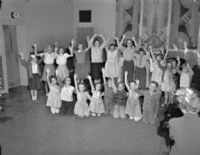
Harold Engel was, with Harold McCarty, the longest affiliated and most influential administrator of the School of the Air. Engel served as assistant director and spearheaded advances in station expansion, public relations, and legislative lobbying with the state and the FCC while McCarty took care of programming and personnel. Through his association with WHA, Engel also became a prominent promoter of educational broadcasting in Wisconsin during the formative years of radio and television.
Engel was born in 1903 in Sun Prairie, Wisconsin and attended Ripon College and the University of Wisconsin-Madison. After college, Engel taught junior high school in Flint, Michigan and worked as an advertising copywriter for General Motors. Engel returned to Madison to work on the production staff of a children’s safety program and helped to organize other educational programs in 1933.
A major part of his service to the station was given to legislative and public relations. He took part in all aspects of the station’s operations, including a move to Radio Hall in 1934 and early planning and promotion of WHA in the 1950s and 60s. Engel was further instrumental in the attempt to secure a clear channel in the 1930s and in obtaining a television license in the early 1950s. Most significantly, Engel helped plan and develop the construction of the state-wide FM network in the 1940s—a legacy Wisconsin still enjoys today.
During his tenure at WHA, Engel served as Professor of Radio and Television Education at the University of Wisconsin-Madison. Engel’s name grew to be nationally synonymous with educational broadcasting. In the 1930s, when other Schools of the Air were being instituted, he was regularly hired as a consultant in program development. For example, records show that he worked for the New Mexico Radio Service in 1935 and 1936, Rocky Mountain Public Radio in 1937, and even went to the Philippines in 1950 as a Fulbright Scholar.
Following the passage of the Communications Act of 1934, Engel became a major proponent of educational radio as a non-commercial medium. He wrote extensively and eloquently on the necessity for University stations to remain independent and non-profit. In a particularly cogent passage, Engel argued: “In radio we find the most potent device ever conceived for influencing human minds and actions. Uncontrolled it could wreck the morale of the nation. Judicially handled it could raise the level of American life to a plane never before attained. To place such a giant power solely in the custody of those whose primary interest is in its pecuniary earning power is folly” (Engel, Box 1).
Engel believed that if certain features of the British system could be modified and applied to the American radio structure, it would result in ‘greater opportunities and pleasures’ for American listeners. If education is a constitutionally delegated state function, he posited, a state should have control over radio facilities adequate to enable broadcasts to be heard at any time by people everywhere within its borders. Thus radio, Engel argued, should be in “the public interest, convenience, and necessity” (Engel, Box 1).
His papers deal exclusively with educational broadcasting, with emphasis upon connections with WHA radio and TV. His papers are divided into 6 major categories. The first is personal, the next four are related to WHA, including radio operations in general, radio service, television, and building plans, and the last with other radio and television materials, including a complete set of reports of the University of Wisconsin Committee on Radio and Television from 1938 to 1957.
Digital Documents
“The Wisconsin Idea” by Harold A. Engel
“The Oldest Station in the Nation” by Harold A. Engel
“Afield with Ranger Mac”, Wisconsin Magazine of History
Related Links
